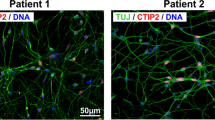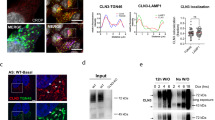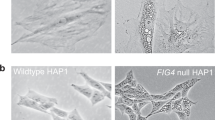Abstract
Chorea-acanthocytosis (CHAC, MIM 200150) is an autosomal recessive neurodegenerative disorder characterized by the gradual onset of hyperkinetic movements and abnormal erythrocyte morphology1,2 (acanthocytosis). Neurological findings closely resemble those observed in Huntington disease3,4,5,6,7,8. We identified a gene in the CHAC critical region9 and found 16 different mutations in individuals with chorea-acanthocytosis. CHAC encodes an evolutionarily conserved protein that is probably involved in protein sorting.
This is a preview of subscription content, access via your institution
Access options
Subscribe to this journal
Receive 12 print issues and online access
$209.00 per year
only $17.42 per issue
Buy this article
- Purchase on Springer Link
- Instant access to full article PDF
Prices may be subject to local taxes which are calculated during checkout

Similar content being viewed by others
References
Levine, I.M., Estes, J.W. & Looney, J.M. Arch. Neurol. 19, 403–409 (1968).
Critchley, E.M., Clark, D.B. & Wikler A. Arch. Neurol. 18, 134–140 (1968).
Hardie, R.J. et al. Brain 114, 13–49 (1991).
Alonso, M.E., Teixeira, F., Jimenez, G. & Escobar, A. Can. J. Neurol. Sci. 16, 426–431 (1989).
Kutcher, J.S., Kahn, M.J., Andersson, H.C. & Foundas, A.L. J. Neuroimaging 9, 187–189 (1999).
Rinne, J.O. et al. Mov. Disord. 9, 297–304 (1994).
Shibasaki, H. et al. Ann. Neurol. 12, 311–314 (1982).
Harper, P.S. Huntington's Disease (Saunders, London, 1996).
Rubio, J.P. et al. Am. J. Hum. Genet. 61, 899–908 (1997).
Rubio, J.P., Levy, E.R., Dobson-Stone, C. & Monaco, A.P. Genomics 57, 84–93 (1999).
Brickner, J.H. & Fuller, R.S. J. Cell Biol. 139, 23–36 (1997).
Redding, K., Brickner, J.H., Marschall, L.G., Nichols, J.W. & Fuller, R.S. Mol. Cell Biol. 16, 6208–6217 (1996).
Bostantjopoulou, S., Katsarou, Z., Kazis, A. & Vadikolia, C. Mov. Disord. 15, 1271–1273 (2000).
Acknowledgements
We thank R. Hardie for collecting samples of families CHAC1 and CHAC9, E. Levy for fluorescence in situ hybridization analysis, S. Humphray for support in physical mapping and D. Higgs for providing K562 cell line RNA. This work was supported by the Wellcome Trust. L.R. is supported by a postdoctoral fellowship of the Italian Telethon and by a fellowship of the University of Padua. J.P.R. is a postdoctoral fellow of the CRC for the Discovery of Genes for Common Human Diseases, which is established and supported by the Australian Government's Co-operative Research Centre's Scheme. N.W.W. is supported by MR C program grant G9706148. J.V. and M.P.-V. are supported by grant 2P01 NS26630. A.P.M. is a Wellcome Trust Principal Research Fellow.
Author information
Authors and Affiliations
Corresponding author
Supplementary information
Rights and permissions
About this article
Cite this article
Rampoldi, L., Dobson-Stone, C., Rubio, J. et al. A conserved sorting-associated protein is mutant in chorea-acanthocytosis. Nat Genet 28, 119–120 (2001). https://doi.org/10.1038/88821
Received:
Accepted:
Issue Date:
DOI: https://doi.org/10.1038/88821



